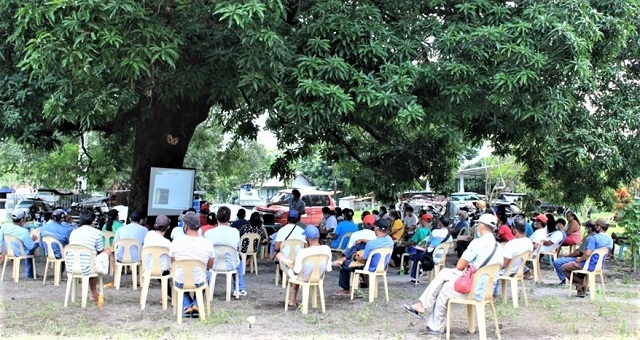
A sturdy stronghold in troubled times, Castillejos in Zambales is fortifying its territory by prioritizing good supply of healthy and safe food with assistance from PhilRice’s RiceBIS project.
Eleanor D. Dominguez, mayor of Castillejos, said that the restricted movements due to the pandemic, destructive typhoons, and crooked traders have severely affected not only the farmers, but also the consumers as these factors threaten food production and the supply chain. Like a reinforced castle (from the Spanish castillo), the third-class municipality is being braced with knowledge and assistance required by the farmers and consumers amidst the pandemic and the new normal.
“I’m a nutritionist by profession and advocate of organic agriculture,” the lady mayor attests. “I am very concerned with what [we] eat. I wish [for my townmates] to be healthy and to eat nutritious food, which can be derived from organic farming…. I encourage our farmers to practice organic agriculture so they could supply the preferred products. To sustain this endeavor, I prioritize the farmers’ needs.”
Introduced to the local government unit (LGU) in February 2020, the RiceBIS project took off in October through a series of trainings on rice production and processing, and organization-building and management.
Four batches of Farmers Field School with 105 participants were conducted under strict health protocols. Apart from PalayCheck, farmers were capacitated through learnings on values formation, leadership, and practice of good management and governance. Field activities were also incorporated in the course.
Based on post-test results, farmers’ knowledge increased by an average of 45.85% while the course was rated as good. Results of their personal entrepreneurial competency assessment also reflected their strong commitment to work.
Blessing
“The RiceBIS Project is a blessing in disguise. The project [triggers] our farmers’ creativity and productivity. As almost all are members of 16 farmer-organizations, our LGU formed them as a federation so that project benefits will be shared by everyone,” Dominguez said.
With good agriculture practices, their town received the Best Demo on Organic Farming Award from the DA. With this feat, RiceBIS farmers intend to venture into brown rice production and consolidated vegetable marketing.
“Camaraderie and willingness to help each other for everybody’s welfare are values rarely observed; but are very much expressed among our farmers. Their willingness to learn and develop new products as a group shows their ‘kayang-kaya basta’t sama-sama’ spirit. This serves as my motivation in pursuing the project amidst the pandemic,” she said.
For the LGU’s project counterpart, municipal agriculturist Janice T. Santiago said Castillejos has already procured two portable dehullers for brown rice production, a moisture meter, and fertilizers based on PhilRice recommendations.
The LGU also has a Bigasan ng Bayan where it buys a kilo of organic palay with 14% moisture content at P21/kilo, against the prevailing price of P17/kilo.
“Though our town’s average yield is already at 3.5-4t/ha, higher than other towns’, we still intend to increase our production by 20cav/ha. We want to become more competitive in the rice market,” Santiago said.
The Rice Competitiveness Enhancement Fund-Seed Program facilitated the timely distribution of 46 bags of certified inbred seeds to the early planters of RiceBIS-Castillejos. It also helped establish two technology demonstration farms showcasing newly released inbred rice varieties including NSIC Rc 506, Rc 508, Rc 510, Rc 512, and Rc 514.
Participatory techno-demo trials on nutrient management and methods of crop establishment were also set up. Twelve farmers also agreed to try the Minus-One Element Technique – a diagnostic tool, which determines the nutrient levels of rice soils.
“The partnership between LGU Castillejos and PhilRice has been amazing. The RiceBIS people have been very energetic in capacitating our farmers and sharing to them the latest technologies. I don’t know where they’ve been drawing their enthusiasm to keep on educating our farmers….. [I hope they] will not leave us, not yet. Our farmers are benefitting from [PhilRice],” Mayor Dominguez said.
To complement the RiceBIS project, the LGU is developing a 4-ha organic agriculture demo farm where organic rice is integrated with vegetable and fruit trees, and with swine, cows, poultry, milk, and honey. Her priority projects also include farm-to-market roads, irrigation canals, modern farm machines, and organic fertilizers.
“Let’s keep the farmers inspired and motivated so they’ll be more productive [and competitive],” the mayor reminds her fellow local executives. “Without our farmers, food security would be in trouble and every family would be in dire crisis surviving this pandemic. [We always] remember that farmers are the backbone of our economy.”
Castillejos is not an air castle. The partnership is helping the municipality live up to its being a true castle that promotes farmers’ welfare and community health.




